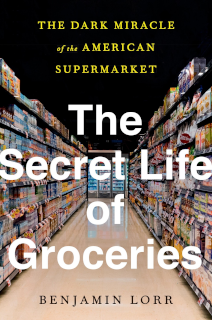
Author: Benjamin Lorr
They say...
A deeply curious and evenhanded report on our national appetites. --The New York Times
An extraordinary investigation into the human lives at the heart of the American grocery store. The miracle of the supermarket has never been more apparent. Like the doctors and nurses who care for the sick, suddenly the men and women who stock our shelves and operate our warehouses are understood as 'essential' workers, providing a quality of life we all too easily take for granted.
But the sad truth is that the grocery industry has been failing these workers for decades. In this page-turning expose, author Benjamin Lorr pulls back the curtain on the highly secretive grocery industry. Combining deep sourcing, immersive reporting, and sharp, often laugh-out-loud prose, Lorr leads a wild investigation, asking what does it take to run a supermarket? How does our food get on the shelves? And who suffers for our increasing demands for convenience and efficiency?
In this journey: - We learn the secrets of Trader Joe's success from Trader Joe himself - Drive with truckers caught in a job they call "sharecropping on wheels" - Break into industrial farms with activists to learn what it takes for a product to earn certification labels like "fair trade" and "free range" - Follow entrepreneurs as they fight for shelf space, learning essential tips, tricks, and traps for any new food business - Journey with migrants to examine shocking forced labor practices through their eyes.
The product of five years of research and hundreds of interviews across every level of the business, The Secret Life of Groceries is essential reading for those who want to understand our food system—delivering powerful social commentary on the inherently American quest for more and compassionate insight into the lives that provide it.
I say...
The Secret Life of Groceries: The Dark Miracle of the American Supermarket, that subtitle says it all. What I expected might be a fun quick read with a number of interesting anecdotes and insights is actually rather dark. Lorr covers his subject fully from sources, production, transportation, to retail there is at least a chapter's material in each case. Descriptions gained primarily through his own experiences, recounted in the book, are included to illustrate the general points and conclusions.
I learn how shopping has changed over time. Learning how it has become personal and a means to express one's values, "... saving money becomes an act of loyalty for family, picky acquisition a sign of concern for health, and the decision to buy your child a more expensive but longed-for item an act of love." I learned how ALDI, the German based grocery giant, was created and what makes it different (clue, think of the situation post WWII) contrasted with such firms as Trader Joe's, which was founded in 1967 by Joe Coulombe in Pasadena, California based on his unique contrarian viewpoint of grocery retail.
The book goes on to help us understand how Lynne, an American truck driver, takes home $17,000 annually from over $200,000 in income. We learn she is slowly going broke and can no longer wonder how or why. From this we understand I realize just how unattractive the job of truck driving can be and why they are a key source of the amazingly low cost of shipping in the modern world. Why do you see recruitment advertisements on the back of every truck? " ... over the last ten years industry turnover in trucking has ranged between 95 to 112 percent." For reference, "The turnover at a top law firm is 17 percent and that has been deemed a crisis for the profession. The turnover at Starbucks is around 65 percent."
Via the story of Slawsa, where founder Julie Busha appeared on Shark Tank unsuccessfully seeking $150,000 of funding, we learn how new grocery products come to market and just how difficult that process is to perform. It is also an illustration of how cost reduction is pushed back on (often small) suppliers and how the means to create "proprietary label" products, we find on the shelves of every major grocery brand, are established.
We come to understand the unattractiveness of a wide range of jobs in the industry. How retail employees are managed to low costs by limiting individual hours to eliminate benefits (triggered by a minimum hours worked) and simultaneously locking in all available hours so workers cannot get a second job.
Finally, and the most difficult for me to read, are how the concepts of organic, fair trade, rain forest friendly, and similar terms are often exploited to mean little other than marketing tools. They are really means to make the grocery stores safe for shoppers not to solve the real problem.
The seals and certifications acting like some sort of moral shield, allowing those of us with disposable income to pay extra for our salvation, and forcing everyone else to deal with the fact that on top of being poor, they were tacitly agreeing to harm the earth, pollute their children via their lunch boxes, and exploit their fellow man each time they made a purchase.
Regarding fair trade in particular we learn about modern day slavery and how large it is along with the difficulty in combating it. The shocking implications of the purchases we make become clear.
I recommend reading the book, but not because you expect reading enjoyment. Read because you want to learn about the issues of a system you are part of and consider how your choices can make a difference.

